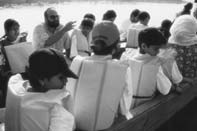 |
|
CSE's Environment
Education Unit targets the future inheritors of this earth and tomorrow's planners and
administrators in its activities. It tries to make the young familiar with issues that are
more contentious and political - Issues that show up linkages between a degrading
environment and poverty, and unsustainable development and inequity in society. |
|
PRODUCTS
Gobar Times: A colourful 8-page tabloid, GT is loved by 'adults' too as
it not only provides a fresh perspective and new ways of looking at environmental issues,
but does so in an engaging, attractive and humorous way. A bimonthly children's supplement
to the fortnightly Down To Earth, teachers and interested parents find it useful as a
teaching aid.
EE Manuals: EE cannot be done in
isolation. It is as much a part of civics and history as it is of chemistry and biology.
In order to help various subject teachers to make EE a part of their classroom teaching,
CSE publishes EE manuals for educators. Beginning with the comprehensive manual based on
The Ecological Footprint Project, we have moved on to manuals on specific issues like air
pollution, with plenty of multidisciplinary activities and worksheets to be used in
classrooms.
Books:
Five storybooks for children: Raindrop, Within the Well, Naina's village, Chilka Adventure
and Chipko. Besides these, books for the young interested in learning more about vital
environmental concepts and issues are being produced. Written in a language that is
familiar and simple, enlivened by cartoons, illustrations, and photographs.
Website (www.cseindia.org): To make our EE Unit accessible to you, the CSE website
connects you to the EEU web pages. Apart from a host of information, the latest events and
happenings, you can also go through an online edition of Gobar Times. Visit to know more
about the programme, ecotours, lectures and presentations, workshops and how you can
participate.
|
|
 |
|
|
PROGRAMMES
Workshops: Two-day
workshops are organised for teachers to reiterate the need to impart EE by infusing it
with the mainstream curriculum, and help in capacity building.
There are also workshops for students that help them produce special editions of Gobar
Times - to create awareness among students, helping them learn about the role of
investigative journalism and the media/press in bringing about change in society, and
impart vocational experience.
Lectures and presentations:Audio-visual shows-cum-lectures are regularly organised in
schools and colleges. Key environment and development issues are discussed. Issues
highlighted are the problems of protected areas, water and air pollution. The programme
includes talks by experts, film shows, and poster exhibitions.
Eco-tours: Various eco-tours are conducted in the city of Delhi as a part of the
Ecological Footprint Project. The Ecotours focus on widening the perspective of students
towards their city's environment and sensitising them to the symbiotic relationship
between a city, its inhabitants and the environment, its functions as an ecosystem,
resource consumption and waste production i.e. its ecological footprint.
Distance Learning: To make all the
material produced by CSE easily accessible, a site offering web-based distance learning
will be created over the next year. Modules and courses on different aspects of
environment will be created. These will be available online, serving as an EE portal for
students, teachers, environment educators or any interested individual.
|
|
THE
ECOLOGICAL FOOTPRINT PROJECT
The project was started to make students aware of their role as urban consumers and its
impact upon their immediate environment, hinterland and beyond. Students are taken on four
ecotours that sensitise them to the symbiotic relationship between a city, its inhabitants
and the environment.
Yamuna Yuk Ride: The city of Delhi depends
on the Yamuna for its water needs, yet it is one of the most polluted rivers, with Delhi's
pollution load virtually killing it. A boat trip down the polluted Delhi stretch creates
awareness about the state of the river.
Water Walk: Delhi has an ancient history of
water harvesting. The ingenious water harvesting structures it contains which were built
over the
centuries to ensure against drought and invasion. A lesson in environmental history to
create awareness about the water use in the past, the conservation and revival of these
structures, and to relate it to the existing water problems plaguing the city.
Jungle Jog: Nature walks in the Delhi Ridge
Forest to sensitise children to the significance of this carbon dioxide sink. To
understand the role of an urban forest, its flora and fauna and
conservation.
Raising a Stink: The ecotour entails visits
to landfill sites, plastic recycling factories, meetings with ragpickers and NGOs working
on the issue of waste. To get students to understand the enormous problem of waste
disposal in a metropolis, their role in waste generation and disposal.
Tours are preceded by an audio-visual show and interactive session with
the students. In order to equip the school teachers to conduct the ecotours on their own,
a manual for school teachers: "Our Ecological Footprint - Think of your city as an
ecosystem" has been produced. You can also create such a program in your town or
city. Please do not hesitate in getting in touch with us for ideas and advice.
Contact: Rustam, Rhinu or Nidhi
Phone : 6081110, 6081124 (ext: 227)
email: rustam@cseindia.org
|
|
|
